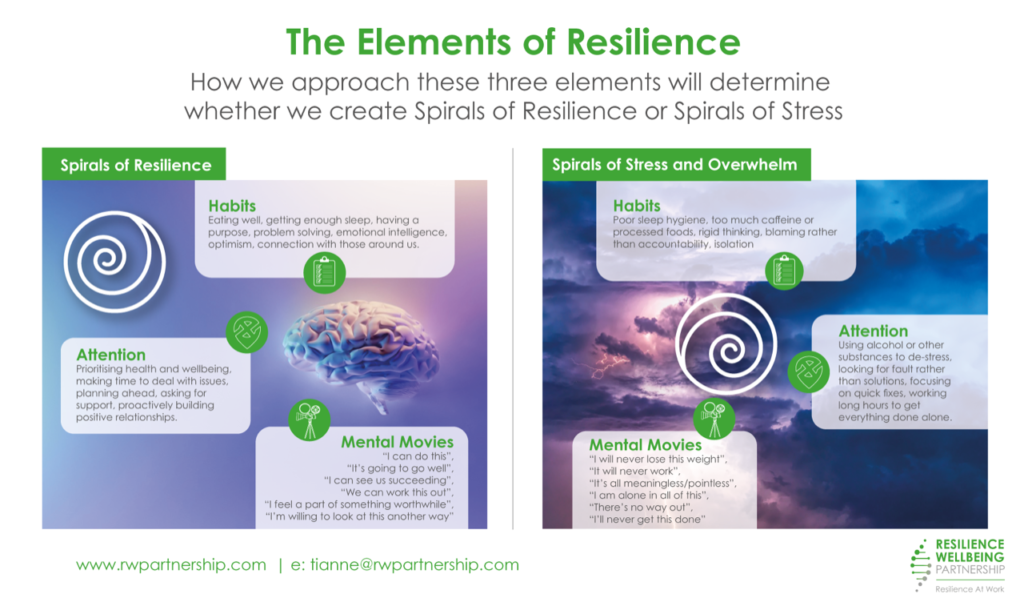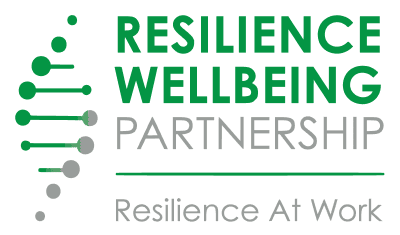Introducing The Six Domains of Resilience

Resilience is a life-long journey rather than a destination… but what behaviours, skills and beliefs contribute to how resilient we are?
We humans are complex beings, and nowhere more so than in the area of resilience. So much contributes to how resilient we are when faced with life’s daily challenges, including beliefs we have about ourselves, people and the world; our skills, talents and education level; the information we take in and consume; our conscious and unconscious biases; what we think and how we think, and our behaviour. Holding all of these elements in mind as separate concepts is a challenge, so it can be helpful to break these elements down into specific topics, also known as domains.
Research by the fantastic team at Mind Matters has found that there are six domains of resilience: Health, Purpose, Problem-Solving, Perseverance, Composure and Relationships. Here we will look at each of the six Domains in turn.
Health
Health is the first and most crucial of the six domains of resilience. If we aren’t taking care of our health, then the other domains will suffer. It’s important to say here that what it means to be ‘healthy’ is different for everyone, but that looking after our body provides a solid foundation for our overall resilience. This includes good quality sleep, balanced nutrition and moving in a way that feels good.
- Sleep. Sleep is essential to our overall health and sense of wellbeing. Our cortisol levels naturally rise in the morning to help us to wake up and get on with the day. But if our cortisol levels are already elevated due to stress, they can get too high, and we can find ourselves waking up suddenly in the night. Most people who are stressed experience this around 3am and 4am. In next month’s blog post we are going to share strategies for good sleep hygiene, so please look out for this if sleep is an area of resilience you struggle with.
- What we consume. When it comes to what we consume, we are all different in our needs. People who have a naturally higher body temperature may prefer cooling foods like salad, for example, whereas others need more warming foods. And while it is true that we are all different, there are some general guidelines that are helpful to most people. These guidelines include reducing our caffeine and alcohol intake, drinking plenty of fresh water, eating a rainbow of fruit and vegetables, avoiding processed foods as much as possible, and cutting out refined sugars.
- Movement. It is important to find ways to move that feel right for our individual body type as we are in our lives now, at this moment, rather than continuing with an activity we have always done which may no longer suit us. Some people love to run whereas others may find this is too much for their system and get exhausted or even injured. Some may find yoga or stretching really energising, whereas for others it’s boring. There are no rules, except to do a little of what you enjoy: this will help you to de-stress, stay in shape and remain supple.
Purpose
Purpose is often linked with passion and vision. If someone is truly living what they are passionate about career-wise, then their purpose is realised. Often, if they can visualise their vision for the future, then again their true purpose is present.
- Values. Purpose is often underpinned by values. Working within teams, once everyone knows the organisation’s values, then alignment occurs and results happen faster. As a leader or people manager, you will likely know how important it is to ensure everyone understands their purpose in the overall organisation and the positive impact this can have on morale and motivation. This can lead to a truly resilient team.
- Drive. Purpose pulls out the ‘drive’ within us. It gets us up each morning, ready to give our all to the day. We may experience days where our drive dips a little, and this is totally normal. Pushing too hard through the days where we feel our Drive is lacking can have an adverse effect. It’s OK to rest and recover on these days, as if we allow ourselves a little rest, our drive will return in abundance.
Problem-Solving
Resilient people are able to first recognise when there is a problem or challenge to be solved, but more importantly, they are able to be creative in finding solutions and taking action.
- Innovation. This is the essence of the Problem-Solving domain of resilience, but relax, it doesn’t mean huge technological innovation, it means the willingness to be open to new ways of doing things and creatively exploring them with an open mind. People who lack resilience in this area may say things like, “It will never work” and while it is a seemingly simple shift, having the attitude of “This could work” is a world apart.
- Proactive planning. Even better than problem solving is the ability to anticipate problems before they happen, but still have a plan in place for the worst-case scenario. Big organisations do this really well with crisis planning, but the same thinking can apply to simple day-to-day tasks. For example, a quick stock take at the end of every week prevents major shortages or delays later down the line.
Perseverance
Perseverance relates to the optimism and flexibility we have when dealing with challenges or setbacks. People who are resilient in this domain can be heard saying things like “We will get there”, “This is doable” or “There’s always a solution”.
- Optimism. It’s important to clarify that we are not talking about false positivity here. Optimism has to be realistic otherwise it can be naive or counterproductive: meaning we have to have the ability to discern between a roadblock and a genuine dead end. Someone with healthy levels of optimism can rightly identify a dead end but then lead their team to look for new and creative routes.
- Adaptability. Rarely do we get things right the first time. This means we need to have a flexible mindset to how we go about achieving our individual or team goals. This also means we have the opportunity to learn and grow from the mistakes we inevitably make along the way. We can take a step back after a project is finished and objectively – rather than critically look at any mistakes, with a view to learning, instead of dwelling on them.
Composure
Composure in this context means being able to have awareness of our emotional state.
- Respond rather than react. People who are resilient in this domain are able to take a breath in challenging or conflict situations and consider what the best response is. Even if they are feeling frustrated, angry or fearful in the moment, resilient people know the value in taking a step back rather than being reactive. Reactivity can lead us to feel – and sometimes ‘be’ – out of control, and when we respond from this place we can inevitably then feel guilty as we regret our actions. The great news is that learning to respond rather than react can be as straightforward as taking a breath, reminding ourselves we have the right to take a moment to think before we speak, or simply asking for a little reflection time.
- Emotional literacy. Composure also means being able to understand and communicate our emotional state to others. This can help us to respond differently to challenging or conflicting situations. For example, we may have a conversation with our boss about potential supply chain issues and notice we feel anxious about the additional workload this could bring. An emotionally literate response would be something like, “I’m noticing I feel concerned about the impact this will have on the team’s workload. Can I take the afternoon to think about communicating this to them and some possible solutions, rather than talking to them about it right now?”. Taking the time to calm ourselves down before communicating messages to others can make a big difference to everyone’s stress levels.
Relationships
We are social beings, and to a greater or lesser degree, we all have a need to connect with other people. The extend to which we can draw on emotional and social support from the people around us can have a huge impact on our levels of resilience.
- Connection. Resilient people are able to make meaningful connections with people inside and outside of work. At work, we see that resilient people are those who draw on the support, strengths and talents of others to get things done rather than going into competition with them.
- Intuition. Using our intuition in relationships can lead us to be better connected with others and of greater support when those around us are struggling. Another big part of resilient relationships is how we communicate with others: can we be honest and authentic in our communications? Can we ask for what we need from others? Can we share how we are feeling? Can we give and receive feedback in a constructive way?
What’s next?
Hopefully, you have enjoyed learning more about each domain of resilience. Watch out for future blogs where we take each of the six domains in turn and delve into them in more detail.
Photo credit
Photo by Emma Gossett on Unsplash
#resilience #wellbeing #resiliencecoach #wellbeingcoach #resilienceatwork





